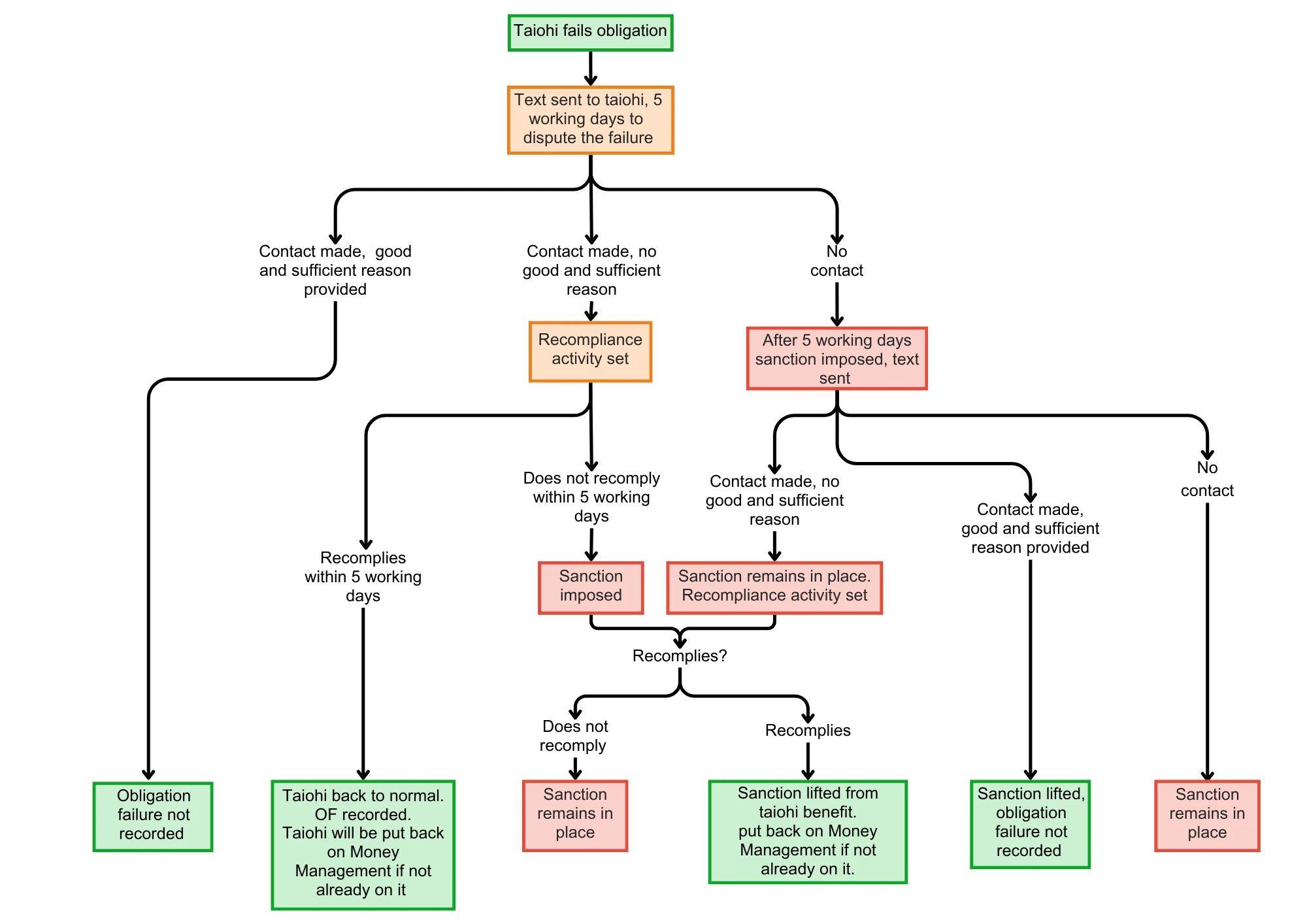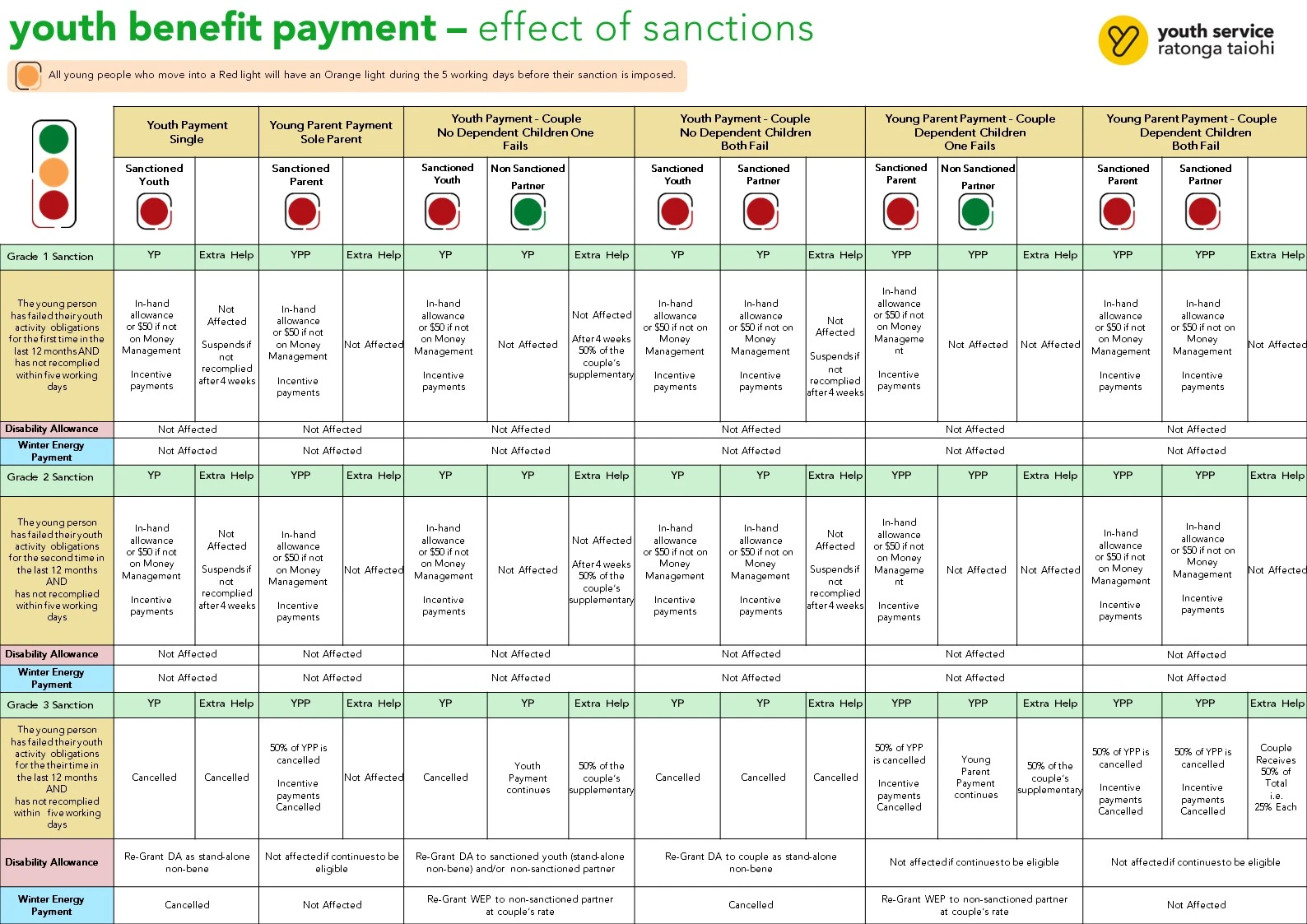youth activity obligation failures
obligation failures and sanctions are a tool to be used when you've tried everything else but taiohi still won't comply with their obligations
recommending a youth activity obligations failure
Even with your support, sometimes young people don't do the things they need to (comply with their youth activity obligations).
In other words, this is when a young person does not:
- attend their meetings with you as their assigned provider
- enrol, undertake, or make themselves available to participate in education, training or work-based learning
- participate in and complete an approved budgeting programme, or parenting programme.
When this happens, you must try to contact the young person to check if they have a good reason for not doing one of the things they need to do to receive payments.
When you can get in contact with the young person
If they have a good a sufficient reason for not doing what they needed to do, you shouldn't recommend an obligation failure, you should instead support the young person to recomply with the obligation or apply for an exemption.
If they don't, you'll need to recommend that YSSU initiate an obligation failure.
For information on good and sufficient reasons see good and sufficient reason before initiating an activity obligations failure | map
If you can't get in touch with the young person
If you cannot make contact with the young person, you must update the activity section in ART to:
- recommend an activity obligations failure
- describe what steps you have taken to contact the young person, and
- detail how the young person has failed their youth activity obligations.
Once the activity is updated, ART will automatically send a notification to YSSU.
YSSU will respond via ART to your notification confirming if the obligations failure has been initiated.
Learn more
Youth Payment - activity obligations failures | map
Young Parent Payment - activity obligations failures | map
Young Partners and Young Parent Partners - activity obligations failures | map

once a youth activity obligations failure has been initiated
The obligation failure is initiated when YSSU agrees with your recommendation that you sent to them in ART. At this point, the young person will move to orange in the traffic light system.
The young person will receive a text message or a letter notifying them of their activity obligations failure. The young person will then have five working days to work with you to:
- recomply with their obligations, or
- dispute their activity obligations failure.
If the young person does not make contact, recomply or dispute their activity obligations failure, they will move to red in the traffic light system. This means a sanction will be in place, and their payments will be reduced or stopped.
If the young person recomplies or provides a good and sufficient reason
If the young person recomplies you will notify YSSU. The young person will not be sanctioned but the obligation failure will still be recorded.
If the young person provides a good and sufficient reason you will notify YSSU. The young person will not be sanctioned and the obligation failure will not be recorded.
After the young person recomplies or provides a good and sufficient reason they will move back to green in the traffic light system.
when a sanction is imposed
Young people will get a text message or a letter when a sanction has been imposed. The young person will be at red in the traffic light system.
The text message or letter will tell the young person that their payments may stop or be reduced. The text message will refer them to the Work and Income website where they can find more information about how to recomply.
You (as their youth coach) will receive a notification from YSSU via ART to let you know that the young person has been notified of their sanction.
During this period
The young person can still recomply or dispute their obligation failure The young person can also dispute the obligation failure within this period.
If the young person does not recomply or successfully dispute their obligation failure, the sanction will be in effect and after four weeks their benefit will be suspended. For young people with dependent children, you'll need to set up a review of entitlement to benefit meeting for their benefit to suspend.
review of entitlement to benefit payment | Youth Service providers
They remain at red in the traffic light system.

disputes or reviewing a decision
A young person has the right to dispute or review activity obligation failures or sanctions.
A young person should always be given the opportunity to review and discuss any decision, including final decisions made by YSSU. If the young person wishes to lodge a dispute or review of decision, you must follow the process outlined here disputes and complaints | youth service providers.
Learn more
obligation failures, disputes and recompliance | youth service providers
recompliance
When a sanctioned young person makes contact with you to review their entitlement to a benefit payment, you must discuss their circumstances and arrange a recompliance activity*.
At this meeting you must discuss:
- if they are prepared to engage and comply with their youth activity obligations
- if they meeting the eligibility criteria
- how have they been living on reduced payments
- and, if they are receiving income from any source.
You must notify YSSU of the outcome of this meeting, including any recompliance activity via ART. YSSU will determine ongoing entitlement and resume the young person's benefit payment if appropriate.
A young person can recomply with their youth activity obligations by participating in the same or a similar activity to the one they were not doing.
As soon as a young person recomplies you must add an activity to the young person's profile ART to capture what the young person is doing to recomply and send a recompliance task to YSSU.
When a young parent doesn't comply for four weeks, you should begin the review entitlement to benefit payment process. See review entitlement to benefit payment | youth service provider
Learn more
*Recompliance activity: an activity is the same or a similar to the activity that the young person not been doing.
recompliance (grade 1 and 2) | map
recompliance (13 week non-entitlement period) | map